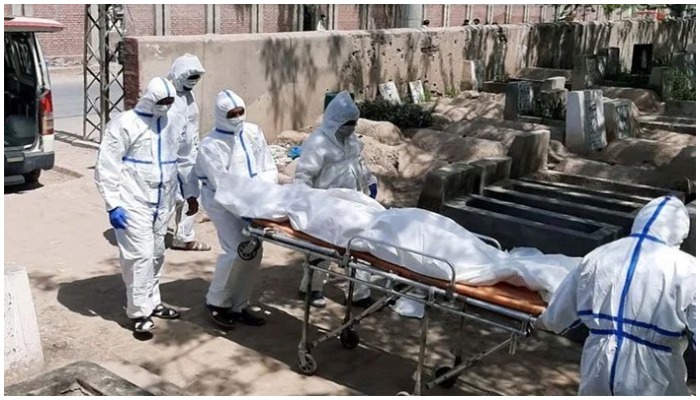Pakistan logs highest COVID-19 case count since pandemic started in 2020
Daily coronavirus death count at highest level in four months, NCOC stats show
January 28, 2022

- Another 30 people in Pakistan succumb to COVID-19 overnight.
- 8,183 people test positive for coronavirus amid a spread in Omicron variant, NCOC stats show
- Pakistan's positivity rate swells to 11.92%.
Pakistan reported the highest number of daily COVID-19 cases ever since the pandemic started in 2020 after 8,183 people tested positive overnight, the National Command and Operation Centre's (NCOC) data showed Friday morning, as the cases continue to rise amid a spread of the Omicron variant.
Meanwhile, the daily COVID-19 death toll also reached a new high since October 6, 2021, as 30 more people succumbed to the virus overnight.
A total of 39 people died of COVID-19 on October 6, 2021.
As per the statistics issued by the NCOC, 68,624 diagnostic tests were conducted across the country in the last 24 hours, of which 8,183 came back positive, pushing the total number of cases reported so far to 1,402,070.
With the detection of new cases, the country's current positivity rate swelled to 11.92%, while the active case count stands at 98,221.
Meanwhile, 1,786 people infected with COVID-19 recuperated overnight, taking the total number of recuperations to 1,274,657.
NCOC extends coronavirus curbs till February 15
A day earlier, the NCOC decided to extend coronavirus curbs in the country from January 31 till February 15, sources told Geo News, as thousands continue to contract the infection amid a spread of the Omicron variant.
The NCOC had imposed non-pharmaceutical interventions (NPIs) on January 19, which were to be reviewed on January 27 in light of the COVID-19 situation in the country.
The restrictions for the wedding sector were already imposed till Feb 15.
For cities/ districts with positivity above 10%:
Gatherings/Weddings:
Indoor gatherings of all types, including weddings.
- Outdoor gatherings, including weddings, will be allowed with a cap of 300 fully-vaccinated guests.
Dinning
- There will be a complete ban on indoor dining. However, outdoor dining for fully-vaccinated citizens and takeaway service will be allowed.
Gyms
- Indoor gyms at 50% capacity for fully-vaccinated individuals will be allowed.
Cinemas
- Cinemas will be allowed to open at 50% capacity for full-vaccinated individuals only.
Shrines
- Shrines are allowed to open at 50% capacity for fully-vaccinated individuals only.
Amusement Parks
- Allowed to open at 50% capacity for fully-vaccinated people only.
Sport
- There would be a complete ban on contact sports like karate, boxing, martial arts, water polo, kabaddi and wrestling.
Education sector
- Schools will be allowed to open with 50% attendance (staggered days) for students below the age of 12 years. For students (fully vaccinated) over 12 years, the NCOC has recommended 100% attendance.
Cities with less than 10%
Gatherings/weddings
- Indoor gatherings are allowed with a maximum limit of 300 guests (fully vaccinated), while outdoor events can be held with a maximum limit of 500 guests.
Dining
- Indoor and outdoor dining is permitted for fully-vaccinated individuals only, while takeaways are allowed 24/7.
Gyms
- Indoor gyms are open for fully-vaccinated individuals only.
Shrines
- Open for fully-vaccinated individuals only.
Parks
- Open for fully-vaccinated individuals only.
Sports
- All types of sports are allowed for vaccinated individuals.
Education
- Children will continue to attend schools with strict standard operating procedures (SOPs), while those above 12-years of age must have to be fully vaccinated.
Restrictions imposed across Pakistan
Business timings
- Businesses will continue without time restrictions
Public transport
- Public buses will be allowed to operate with 70% of their seating capacity. Wearing masks will be mandatory throughout the journey, with a complete ban on serving meals/snacks.
Railways
- Railways will operate with an 80% occupancy level.
Office routine
- Offices will be allowed to operate at 100% capacity with normal working hours. However, work from home is encouraged.
Domestic air travel/meals
- There will be a complete ban on meal/beverages serving during the in-flight journey for domestic travel.
Education sector
- With effect from February 2022 vaccination for students above 12 years will be mandatory (at least one dose). No exemption other than medical reasons will be entertained.
- Aggressive sentinel testing in educational institutions will be carried out for targeted closures in high disease prevalence education institutes.
- Federating units in consultations with health authorities will set a number/percentage for closure of education institutes.
Mask wearing
- Compliance with compulsory mask-wearing while incorporating innovative measures for enforcement. Strict adherence to SOPs in mosques and other places of worship be ensured by all federating units.
Extended lockdowns
- Targeted lockdown with stringent enforcement protocols based on risk assessment will continue.











